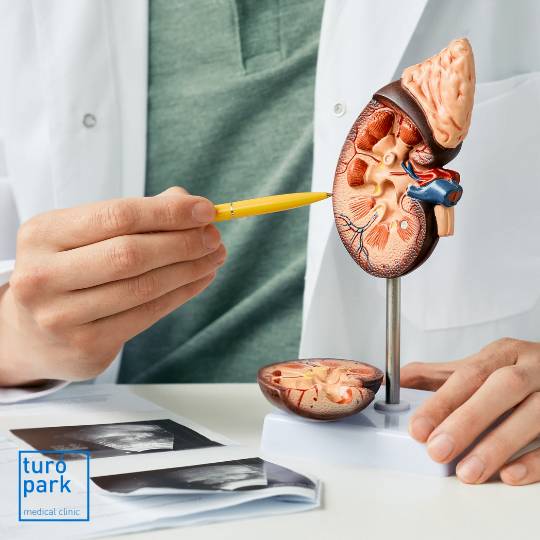Prostate cancer screening and treatment in Barcelona
In Europe, prostate cancer is the most common cancer in men. It most often occurs after the age of 50 and does not always cause symptoms. It progresses slowly and can often be removed completely or treated effectively if diagnosed before it spreads outside the prostate.
If you are suffering from prostate cancer, if you have any doubts about your health, or simply if you are over 50 and would like to be screened, do not wait to make an appointment with our specialist urologist in Barcelona.
What is prostate cancer?
Prostate cancer is a disease that develops from initially normal prostate cells that change and multiply uncontrollably until they form a malignant tumor.
The malignant tumor is made up of cancerous cells that can invade and destroy nearby tissue. It can also spread (metastasize) to other parts of the body, especially the bones and lymph nodes of the pelvis.
Fast track your treatment
To book an appointment or speak with one of our friendly team, please get in touch using the options below.

What causes prostate cancer?
The causes of prostate cancer are still poorly understood, and could often be multiple:
- Age: 66% of prostate cancers occur in men aged 65 and older
- Genetic predisposition: about 20% of prostate cancers are related to family background and occur in families where prostate cancers are more numerous than average
- Ethnic background: black men have more prostate cancers than white men, and Asian men have less prostate cancers
- Exposure to pesticides and endocrine disruptors
- Smoking
- Diet
- Parkinson's disease: People with Parkinson's disease and their relatives up to the third degree have a higher risk of prostate cancer
Your health is our priority.
Our team of urologists treats urinary tract disorders in women and men.

Prostate cancer: symptoms
At the beginning of its evolution, prostate cancer does not give any symptoms. Its discovery is therefore often totally fortuitous, for example during a health check-up.
The mechanical symptoms due to the compression of the urethra appear when the prostate increases in volume and are generally expressed by :
- Difficulty in urinating,
- A need to push,
- Erectile dysfunction,
- Frequent urges to urinate,
- Pain when urinating,
- Pain with ejaculation,
- The presence of blood in the urine or semen.
However, these symptoms are generally a sign of an increase in the volume of the prostate but are not necessarily indicators of cancer. They are in fact very common in cases of prostatitis or benign prostatic hypertrophy.
How is prostate cancer diagnosed?
If prostate cancer is suspected, the urologist will always first perform a digital rectal exam to feel the prostate and detect any irregularities or changes in consistency.
If the clinical examination is abnormal, the specialist prescribes a blood test for Prostate Specific Antigen (PSA), a substance produced by the prostate. If this level is high or if its progression is rapid, cancer must be suspected, but be careful here too, because a high level does not necessarily indicate cancer.
If the doctor finds abnormalities that indicate prostate cancer, he will order a prostate biopsy, which will allow the diagnosis of cancer to be made with certainty. Other examinations such as a CT scan, an MRI or a bone scan can then be performed to determine if the disease has spread.
Prostate cancer: treatment
The treatment of prostate cancer depends on the patient's age, general health, and the extent of the cancer. In general, it involves surgery (total prostatectomy), radiation therapy, and possibly hormone therapy and chemotherapy.
Our English-speaking urologists

